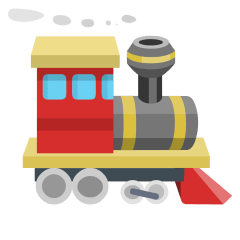🚂Meaning and Description
The emoji 🚂 shows a steam locomotive, which is an old-fashioned type of train that runs on steam power. The locomotive has a red body with a black front and a chimney that emits white smoke. The locomotive is facing left and looks like it is moving on a railway track.
The steam locomotive was one of the first inventions that revolutionized transportation in the 19th century. They became widely used for passenger and freight transport until the mid-20th century, when they were replaced by electric or diesel trains.
It usually refers to trains, railways, or travel in general. It can also be used to express nostalgia, admiration, or enthusiasm for steam locomotives or the history of transportation. Sometimes, 🚂 can be used metaphorically to indicate speed, progress, or momentum.
Additionally, in a more metaphorical sense, it can represent being on track with one's goals or, sometimes, to humorously indicate that someone is "boarding the hype train." On the flip side, a unique usage could be to signify something that's moving at a snail's pace🐌.
The steam locomotive was one of the first inventions that revolutionized transportation in the 19th century. They became widely used for passenger and freight transport until the mid-20th century, when they were replaced by electric or diesel trains.
It usually refers to trains, railways, or travel in general. It can also be used to express nostalgia, admiration, or enthusiasm for steam locomotives or the history of transportation. Sometimes, 🚂 can be used metaphorically to indicate speed, progress, or momentum.
Additionally, in a more metaphorical sense, it can represent being on track with one's goals or, sometimes, to humorously indicate that someone is "boarding the hype train." On the flip side, a unique usage could be to signify something that's moving at a snail's pace🐌.
💡Extended reading and popular science
The meaning of emoji symbol 🚂 is locomotive, it is related to engine, railway, steam, train, it can be found in emoji category: "🚌 Travel & Places" - "⛽ Ground Transport".
🚂Examples and Usage
🚂Images from Various Manufacturers
🚂Basic Information
| Emoji: | 🚂 |
| Shortname: | locomotive |
| Apple Name: | steam locomotive |
| Known as: | Railway Locomotive | Steam Train |
| Codepoint: | U+1F682 Copy |
| Shortcode: | :steam_locomotive: Copy |
| Decimal: | ALT+128642 |
| Unicode Version: | 6.0 (2010-10-11) |
| Emoji Version: | 1.0 (2015-06-09) |
| Categories: | 🚌 Travel & Places |
| Sub Categories: | ⛽ Ground Transport |
| Keywords: | engine | locomotive | railway | steam | train |
| Proposal: | L2/09‑114 |
👨💻Unicode Information (Advanced Usage)
🚂Trend Chart
🚂Popularity rating over time
Date Range: 2019-04-07 - 2024-04-07
Update Time: 2024-04-13 17:35:54 UTC 🚂and in the last five years, the popularity of this emoji has undergone several large changes.In 2019-06 And 2021-10, its popularity showed the biggest increase.In 2018 and 2021, the trend of its popularity converge.
Update Time: 2024-04-13 17:35:54 UTC 🚂and in the last five years, the popularity of this emoji has undergone several large changes.In 2019-06 And 2021-10, its popularity showed the biggest increase.In 2018 and 2021, the trend of its popularity converge.
🚂See also
🚂Relative Topic
🚂Extended Content
🚂More Languages
| Language | Short Name & Link |
|---|---|
| Arabic | 🚂 جرار بخار |
| Bulgarian | 🚂 локомотив |
| Chinese, Simplified | 🚂 蒸汽火车 |
| Chinese, Traditional | 🚂 蒸汽火車 |
| Croatian | 🚂 lokomotiva |
| Czech | 🚂 lokomotiva |
| Danish | 🚂 lokomotiv |
| Dutch | 🚂 locomotief |
| Filipino | 🚂 makina ng tren |
| Finnish | 🚂 veturi |
Search
Recents
No recent use emoji
Emojify...
Emojify Success























